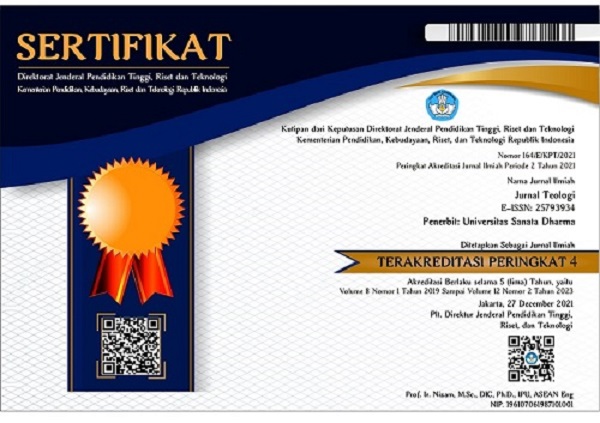A Parody of Psalm 8 in Job 7:17-19
(1) Universitas Sanata Dharma, Yogyakarta, Indonesia
(*) Corresponding Author
Abstract
Keywords
Full Text:
PDFReferences
Clines, David J. A. Job 1-20. WBC 17. Dallas, Tex.: Word, Incorporated, 2002.
Dell, Katharine J. Job: Where Shall Wisdom Be Found? Phoenix Guides to the Old Testament. Sheffield: Sheffield Phoenix Press, 2013.
. The Book of Job as Sceptical Literature. BZAW 197. Berlin: De Gruyter, 1991.
Driver, Samuel Rolles, and George Buchanan Gray. A Critical and Exegetical Commentary on the Book of Job. ICC. Edinburgh: T & T Clark, 1921.
Eaton, John H. Job. JSOT 005. Sheffield: JSOT Press, 1985.
Gibson, John Clark Love. Job. OT Daily Study Bible. Philadelphia: The Westminster Press, 1985.
Gray, John, and David J.A. Clines. The Book of Job. The text of the Hebrew Bible 1. Sheffield: Sheffield Phoenix Press, 2010.
Holladay, William Lee, Ludwig Hugo Koehler, and Walter Baumgartner. A Concise Hebrew and Aramaic Lexicon of the Old Testament. Leiden: Brill, 1971.
Perdue, Leo G. Wisdom in Revolt: Metaphorical Theology in the Book of Job. Bible and Literature Series 29. Sheffield: The Almond Press, 1991.
Watson, W. G. E. Classical Hebrew Poetry. A Guide to Its Techniques. JSOT 026. Sheffield: JSOT Press, 1984.
Whybray, Roger Norman, Margaret Barker, and Katharine J. Dell. Wisdom: The Collected Articles of Norman Whybray. SOTS. Aldershot: Ashgate, 2005.
DOI: https://doi.org/10.24071/jt.v7i1.1200
Refbacks
- There are currently no refbacks.

This work is licensed under a Creative Commons Attribution-ShareAlike 4.0 International License.
.jpg)
Indexed and abstracted in:
P-ISSN: 2302 - 5476 (Validity starting Volume 2012-10-05)
E-ISSN: 2579 - 3934 (Validity starting Volume 6, No. 1, Mei 2017)
Jurnal Teologi (Journal of Theology) by Faculty of Theology Sanata Dharma University

This work is licensed under a Creative Commons Attribution-ShareAlike 4.0 International License.














